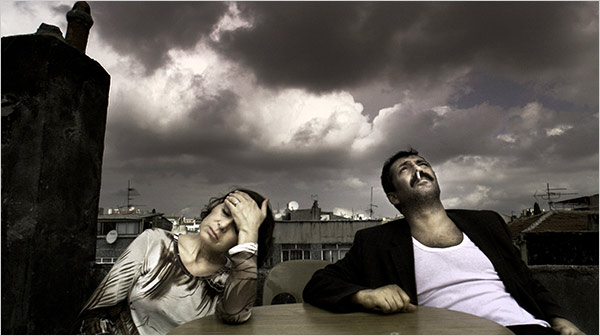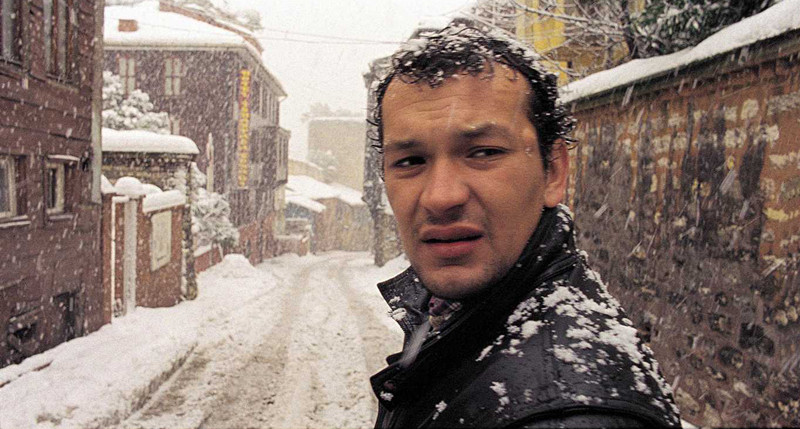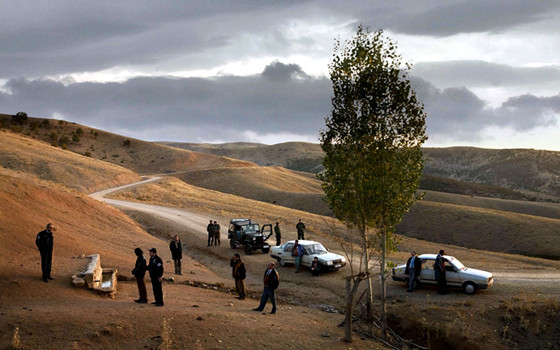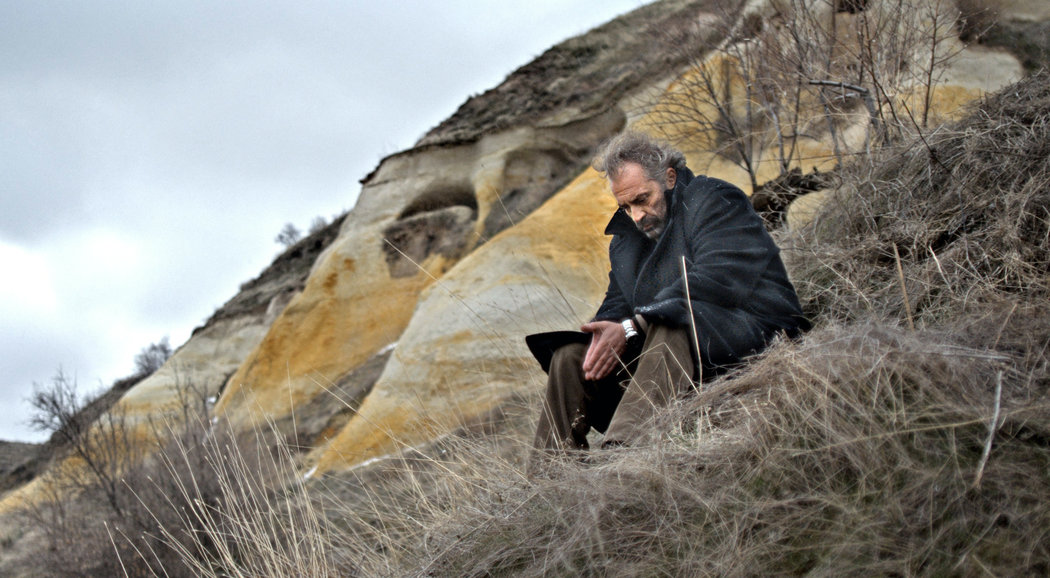4. Three Monkeys (2008)

One of the distinct traits in films by Ceylan is that he avoids shooting about politics and even if he does so, the theme is something more akin to a background for the main story, which supports the storyline and makes it more dense and interesting.
“Three Monkeys” has a special place in his filmography. It is a strong social drama about a family of three, which contains political elements and mystic aspects.
The story begins when wealthy businessman, Servet, who is entering politics, hits a pedestrian and runs away. To avoid imminent resonance in the media, he decides to ask his driver Eyup take the fall and offers him money instead. While Eyup is in jail, Servet and Hacer, the wife of the driver, start a love affair. The situation becomes more complicated when the son, Ismail, learns about the affair between his mother and his father’s boss.
The title of the movie refers to a Japanese parable about three monkeys: “see no evil, hear no evil, speak no evil.” The characters are like these apes – they decide to not pay attention to the evil that is around. As a result, they are involved in it or sometimes even cause it to happen.
Like in previous movies by the director, the silence around the events in “Three Monkeys” that shape the lives of the family members is present. They don’t discuss treachery, pain, murder or any other incident that disturbs their inner world.
Regarding the visual scenes of the film, they are perfect as always: long takes of brooding Istanbul, distant shootings, scenes in the shadow of the sun, views beyond the cell, the appearing of the ghost of a child fulfill the film with disturbance, premonition and boredom at the same time.
3. Distant (2002)

“Distant” is the last film from Ceylan’s Village Trilogy (“The Small Town” in 1997 and “Clouds of May” in 1999) and contains autobiographical elements as well. It’s a story about cousins: Mahmud is a photographer and lives in Istanbul, and the younger one, Yusuf, is from small town and has arrived to the city to find a job and temporarily lives at Mahmud’s place.
Mahmud is a person who has lost all his ideals, has stopped believing in everything, and doesn’t want to communicate with anyone. He doesn’t reply to the calls from his mother and sister, offends Yusuf, and doesn’t want to admit to his mistakes. When he accuses Yusuf of stealing his watch and then finds it in the box, he doesn’t apologize for his mistake and doesn’t even tell him that the watch has been found.
Mahmud wants him to think that his cousin doesn’t trust him. He wants to get rid of Yusuf because he reminds him of his past, the past he struggles to forget. Mahmud refuses to smoke Yusuf’s cigarettes and calls it rubbish, but these are probably the cigarettes he used to smoke when he was young. And only at the last scene after Yusuf has left, does he take his cigarettes and go back to the past for a few minutes.
The audience learns about Mahmud’s loss of ideals and meaning of life in some scenes, capturing the discussion about the death of photography. In the other scene, he decides to take a photo of the wonderful village view, but changes his mind because knows that nobody needs it. Ceylan expresses the same idea while discussing the most controversial scene of “Distant”.
The scene where Mahmud and Yusuf are watching “Stalker” by Tarkovsky and later Yusuf goes to sleep, Mahmud switches “Stalker” to a porno film. Ceylan insists that the key for this scene should be sought in the previous one when Mahmud is talking to his friends. One of them asks: “Where are your ideals? You were dreaming to direct movies like Tarkovsky.” And Mahmud puts on a film by Tarkovsky to find his ideals back, but at the end turns it off because it is easier to live without them.
In the film, Ceylan pays special attention to Istanbul. The director tries to capture the whole beauty of the city but tries to maintain the mood of Mahmud. Mahmud’s Istanbul is empty, grey, and the unstoppable snow makes us feel his desperation. “Distant” is filled with symbols such as slowly falling lampshade, a little night light, and a mouse in kitchen that Mahmud wants to catch but doesn’t dare kill.
2. Once Upon a Time in Anatolia (2011)

“Once Upon a Time in Anatolia” is considered a turning point in the filmography of the director. The film, which received the Grand Prix award at the Cannes Film Festival, is based on true events that took place in Anatolia and was told to Ceylan by the doctor who was part of that story. What’s interesting is that the doctor himself has an episodic role in the film.
“Once Upon a Time in Anatolia” contains a few plot lines, which are tangled up in a search of the body of murdered. Police officers, a doctor, a prosecutor, and two brothers who are suspected of committing homicide are driving around the Anatolian landscape during the night to find the body as brothers can’t recall where they had dug it.
On their way, they discuss various topics, from food and health to politics and philosophy. By using this vehicle, Ceylan tries to open up the hearts of Anatolians to an ordinary Istanbulian and other people around the world. During the film, which runs approximately three hours, some essential secrets are revealed and it makes events more interesting and explicable.
As the director has grown in similar environments of slowness and the delight of nature, he easily captures the unhurried and breathtaking views of Anatolia, and tells us about power of beauty, but at the same time shows its harshness. In spite of its magical beauty, it can be extremely cruel to people, especially women. While talking about the daughter of the village official, the doctor says she is going to wilt like a flower in that severe place.
Through depicting the sameness of the environment, Ceylan heightens the feeling of unrelieved confinement of residents in the region, and the fact that the characters face difficulties to find the place the where body is buried is used to emphasize this.
On the other hand, the film is filled with many literary and cinematic references. The sophisticated gaze of cinephiles will find many tributes to Kiarostami and Tarkovsky, and for someone inspired by classical literature, it will be interesting to note similarities with Chekhov’s stories.
1. Winter Sleep (2014)

The last film (so far) directed by Ceylan is “Winter Sleep”, the second film in history of Turkish cinematography that received the Palme d’Or at the Cannes Film Festival. It is based on two short stories by Anton Chekhov- “Good People” and “The Wife”. However, Ceylan denies the film is the adaptation of the stories.
“Winter Sleep” is a story about Aydn, a retired theatre actor who keeps a hotel in Cappadocia and lives with his young wife, Nihal, and divorced sister, Nejra. Ceylan shows how untold words and unrevealed feelings can ruin relations between people, and how this can make the love fade away.
Although the loss of ideals is a common theme for all films by Ceylan, in “Winter Sleep” the only thing that Aydn has is the ideals or maybe the idea of having ideals. “You are using your ideals and beautiful words merely for humiliating others, your ideals make you hate everybody,” Nihal says during a fight with husband. Aydn has filled the whole space with his ego and arrogance and there is nothing left for Nihal, even breathing.
Every time she wants to do something on her own, he is there, trying to interfere or help. Meanwhile, from Aydn’s perspective, the plight differs: the only thing he wants is to be beside Nihal, but his pride will never let him talk about that, and all the feelings he wishes to share – love, tenderness or unbearable pain – are hidden behind his theatrical grin.
The talented Ceylan makes his audience feel the atmosphere of “Winter Sleep” more deeply by choosing wonderful locations in which to shoot. Because of the mountains of Cappadocia, snow and lonely landscape, cold colors and the heartbreaking music of Schubert, we experience the same pain and sadness, and see the loneliness of the heroes.
In an interview, Ceylan said he considers Yasujirô Ozu as a teacher and role model, but his way of expressing relationships between characters is closer to Italian director Michelangelo Antonioni. And, of course, the influence of Chekhov should not be forgotten. Once Antonioni was asked whether his films are about crises in relationships, and he replied: “It’s about their absence”.
Meanwhile, in the stories by Chekhov, characters always find strength to say what’s in their heart. The characters of Ceylan are between these two sides, but they are falling into emptiness and apathy. But the title of his last movie has a gleam of optimism and there is still hope that one day, people will wake up from their winter sleep and find back their lost ideals, feelings and love.
Author Bio: Sona Karapoghosyan is a PhD student at the faculty of Oriental Studies, YSU. Currently she is working on several film projects and writing dissertation on Turkish Cinema.